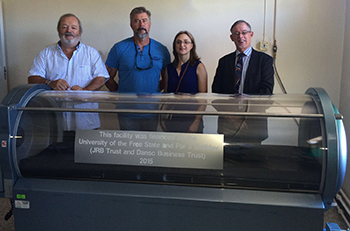Latest News Archive
Please select Category, Year, and then Month to display items
12 January 2024
|
Story Nonsindiswe Qwabe
|
Photo Sonia Small
 Since joining the UFS in 2008, Dr Grey Magaiza has worked extensively on approaches that can foster the socio-economic transformation of societies.
Since joining the UFS in 2008, Dr Grey Magaiza has worked extensively on approaches that can foster the socio-economic transformation of societies.
“The future should be one where communities can decide on their development agenda and futures. That’s the most important for me.” Dr Grey Magaiza, Deputy Director of the Centre for Gender and Africa Studies (CGAS) and Head of the Community Development programme on the Qwaqwa Campus, is passionate about capacitating communities to be agents of change and advancement. His vision for the future emphasises the empowerment of communities to take charge of their development by actively participating in decision making and the implementation of development projects that can improve their lives.
Since joining the UFS in 2008, Dr Magaiza has worked extensively on approaches that can foster the socio-economic transformation of societies. Over the years, he has crafted his research speciality into one that he is most proud of – being an interdisciplinary scientist immersed in the development of communities.
“I’m in a fortunate position of researching what I like. I say ‘fortunate’, because I’ve taken the time to understand what I’m passionate about, which is the overall field of rural livelihoods and livelihood futures – in short, community development. My research starts from an engaged university, understanding the elements that a university must use to enhance transformation and relevance to its immediate community in terms of development.”
One of the ways he has done this is by looking at social entrepreneurship as a development approach for young people in a rural setting. Through workshops with non-profit and civic organisations in Qwaqwa, Dr Magaiza has been helping these organisations to map out their needs and actively meet them through the involvement and support of external role players.
“We understand that communities are part of the national development agenda, but even that national agenda respects community knowledge and intentions and allows communities to shape their identity. A critical enabler of this is community organising. You bring back the capacity in communities to have dialogues on issues affecting them as spaces for engagement, knowledge exchange, and for people to just talk about their way forward.”
By enabling communities to define their development agenda, they can address their specific needs, challenges, and aspirations, he said. “When I look at livelihood futures, it’s quite an exciting aspect of my work – it’s like looking into a fortune tellers’ globe, because you’re not deciding for communities what they should do, but the communities themselves take those decisions.”
Department of Oncology provides hyperbaric chamber to cancer patients – a first in the Free State
2016-03-21

From the left: De Villiers Brink, Gys Botes (both of the Par3 Golfday group that donated towards the hyperbaric chamber), Dr Alicia Sheriff (Head of the UFS Department of Oncology) and Prof Gert van Zyl (Dean of the UFS Faculty of Health Sciences). |
Thanks to the Department of Oncology at the University of the Free State (UFS), cancer patients now have access to a hyperbaric chamber – a medical treatment that enhances the body’s healing process through the inhalation of oxygen.
In order to realise this tremendous addition to the treatment of cancer patients, the Department of Oncology established collaboration between the UFS School of Medicine, the Free State Department of Health, and a group of private donors. Currently the only one in the Free State, the hyperbaric chamber has been installed at the Oncology ward at National Hospital in Bloemfontein and will benefit not only patients from the Free State, but also the North West province and the Northern Cape.
While lying down in the chamber, the patient’s body absorbs more oxygen as a result of the high levels of air pressure. This process stimulates the healing of cancer wounds and various other injuries, including sports injuries.
Dr Alicia Sherriff, Head of the Department of Oncology (UFS), says her team is passionate about enhancing the quality of their patients’ lives, even when facing difficult circumstances. “I believe that the hyperbaric chamber is just one way of achieving this, since it helps decrease the harm done by certain medical conditions on the human body,” Dr Sherriff says.